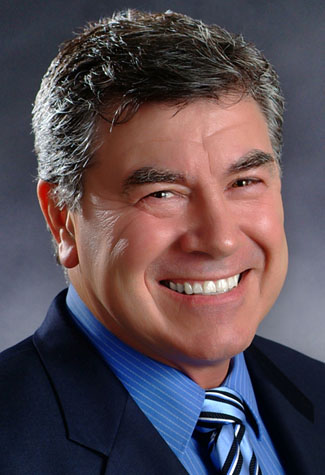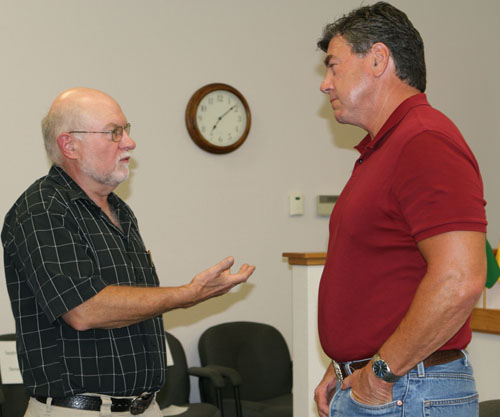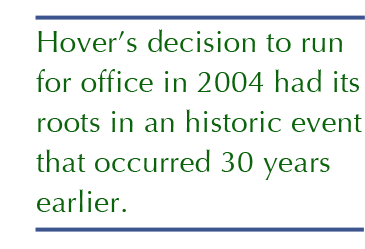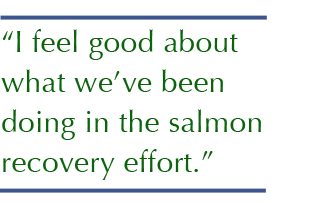home | internet service | web design | business directory | bulletin board | advertise | events calendar | contact | weather | cams

|
Full Circle  Bud Hover lost his bid for a third term as an Okanogan County Commissioner by just 10 votes. Photo courtesy Bud Hover Bud Hover lost his bid for a third term as an Okanogan County Commissioner by just 10 votes. Photo courtesy Bud HoverBud Hover, the two-term Republican Okanogan County Commissioner who lost his seat by 10 votes to fellow Republican Ray Campbell, says perceptions, especially among Farm Bureau and county Republican committee officials, that he was too liberal led to his defeat. Both organizations endorsed Campbell. “I was told I was too green,” he said to the Grist Wednesday. A former chair of the county’s Republican committee and a 30-year member of the county Farm Bureau, Hover lost the endorsement of the committee he had once headed, as did defeated Republican commissioner Andrew Lampe. “It’s gotten so far right,” he said of the county’s Republican party. “I did everything I could to hold the seat and it didn’t work,” said Hover. “I feel bad for all the folks who voted for me that I wasn’t able to win.” Hover, a Winthrop hay rancher, former Washington Redskins professional football player, and former president of the board of the Okanogan County Electric Cooperative, told Grist, “I’ve always supported agriculture.” But he said he feels he was punished at the polls for trying to work with environmentalists, Democrats and Indian tribes to solve contentious problems. Many Republicans assumed that because he listened to and tried to work with people on the opposing side, “I must be one of them,” he said. “I honestly consider myself very conservative. But I’m not blind to the problems that exist. I’m not blind to the laws we have to adhere to,” said Hover. “It’s easy to spout a lot of political rhetoric because that’s what people want to hear,” he added. “`We’re over-regulated. We don’t want any government’. They go so far right that they are over with the far left. Government does have a place in our lives to maintain order.” Hover claimed the Omak Chronicle engaged in unbalanced reporting, playing its stories of the race to favor Campbell, even when Hover beat him in the primary. The paper endorsed Campbell, and Hover said he may have alienated its editor, Roger Harnack, who had argued that the county’s legal notices should be placed in the Chronicle instead of the Oroville Gazette, which has much smaller circulation. But Hover said he opposed Harnack’s request for the contract to publish the county’s legal notices because Harnack was asking $30,000 to $40,000 more than the Gazette. “That sounds like sour grapes to me,” responded Harnack, who said his newspaper’s coverage of the race had been fair. The “biggest factor” in the paper’s decision to support Campbell editorially “was that Ray more genuinely represented the people who live here. He’s still very much a part of the community,” said Harnack, while “Bud in time has distanced himself from the electorate.”  Outgoing county commissioner Bud Hover, right, confers with county planning director Perry Huston. Photo by Solveig Torvik Outgoing county commissioner Bud Hover, right, confers with county planning director Perry Huston. Photo by Solveig TorvikAsked if the dispute over the placement of legal notices affected his decision to endorse Campbell, Harnack answered: “I’m not going to comment on his numbers. I don’t believe they’re accurate. Our rates are higher because we cover the entire county,” but he said the Chronicle has the lowest advertising cost per reader in the county. “It definitely was a factor in our discussion [on editorial endorsement] because he missed a clear point in law that circulation does matter,” said Harnack, who added that “circulation” means “overall readership.” Harnack suggested the legal notices in at least one instance may have been placed in the Gazette to avoid having them read by citizens in Omak who would be affected by having the county build an open septic lagoon next to the Omak Airport. The Gazette “has no readership to speak of in Omak and certainly not around the airport,” he said.
Hover told Grist that the decision to publish legal ads in the Gazette was taken with the understanding that the information also was made available to the public online. “It’s one thing to get there [on the commission] and another thing to govern,” said Hover. “One of Ray’s big campaign promises was that he was going to stop the [Washington State Fish and Game Department] from buying land” in the county, he added. “We don’t have the authority to do that.” But it is possible for county officials to work with state officials to mitigate economic impacts on the county, Hover said. County commissioners who run on a promise of protecting property rights face a dilemma as well as potential accusations of hypocrisy, according to Hover. “If they are going to stand between the sale by a willing seller to the game department…there are going to be legal ramifications” because it contravenes an individual’s legal right to sell property - an awkward position for property rights champions to defend. However, he noted, commissioners who do promise voters to end such sales but don’t try to prevent them will be failing to uphold their promises to voters. One of the first tests of Campbell’s promise to stop private property sales to the state may come in January, when the state wildlife agency is expected to take action on the purchase from a willing seller of 300 acres of valley property that lies on both sides of the Loup Loup Highway. “I’m just going to encourage them in every way I can to stop all sales,” said Campbell when asked about the Loup Loup transaction. “Yes, that is my intention.”
Hover’s decision to run for office in 2004 had its roots in an historic event that occurred 30 years earlier. In 1974, U.S. District Court Judge George H. Boldt famously ruled that when ceding huge portions of their lands, certain Washington Indian tribes signed treaties with the U.S. government that are legally enforceable contracts. In these contracts, the tribes also granted white settlers access to the tribes’ salmon runs -- not the other way around. The treaties specified that tribes retained rights to fish in their “usual and accustomed” places, and Boldt ruled that the intention of the signers was for salmon runs to be shared, with tribes entitled to the opportunity to harvest half the runs. Boldt’s ruling eventually was to have profound effects far from the fishing grounds. The salmon fishery was in deep trouble for many reasons, including over-fishing and environmental degradation. The federal Bonneville Power Administration’s dams blocked fish passage on the Columbia River, and water in the Columbia watershed’s many salmon-spawning tributaries, such as the Methow River, was being used by irrigators. Hover would become one of them. The tribes pressed to put salmon, and the water they needed, back in spawning streams, arguing that otherwise their treaty rights would be nullified. This finally led to an attempt in the 1990s by the Washington State Department of Ecology to persuade inland irrigators to find ways to conserve water, but Methow Valley irrigators dug in their heels. And the county commissioners refused to cooperate with the state’s salmon-saving efforts. The county commissioners’ intransigence led to the Methow Valley being hit by the strictest, “one-size- fits- all” salmon-saving template of any county in the state, according to Hover. The commissioners missed an opportunity to help craft a local solution that would have been easier to live with, he has argued. The upshot of the stand-off was that the National Marine Fisheries Service, in effect, sequestered for salmon water that flowed across U.S. National Forest Service lands into Methow Valley irrigation ditches.
But the former angry irrigator who ran for office partly to protect his water rights today finds himself trying to save the salmon runs. Governor Christine Gregoire appointed him to the Upper Columbia Salmon Recovery Board, and he also serves on the state’s Recreation and Conservation Office’s Salmon Recovery Board. “I have come full circle,” Hover said. “I went to a salmon ceremony,” Hover recalled, and that was when he realized “It wasn’t about money for them. It was about culture, and a religious type of thing. That hit me really hard. These guys are fighting for something greater than irrigation water. It’s a way of life, whatever you want to call it, on a deeper level than just money.” “I feel good about what we’ve been doing in the salmon recovery effort,” Hover added. The dollars that it brings to the county “are really important to us,” he added, and rebuilding the fish runs can mean the county will have an economic generator from the sports fishing industry. He said he leaves the county commission pleased with its improved financial condition. “When I came in eight year ago it was in complete disarray,” he said of the county’s fiscal situation.” But it recently received an A-plus rating from Standard and Poor’s, the first such rating in the county’s history, for sound fiscal management. The rating allows the county to restructure its debts and save $300,000, according to Hover. It also has $500,000 set aside in a medical savings account and has lowered its liability insurance payments by $125,000. When he came on the commission, explained Hover, the county had such a volume of lawsuits, many of them from county employees, “that our risk pool was talking about dropping us.” Now, he said, the number of lawsuits is “miniscule.” Hover recently obtained a master’s degree in public administration from the Daniel J. Evans School of Public Affairs at the University of Washington and said he hopes to continue in public service. 12/7/2012 Comments Bud, it's disappointing to see you leave the county commission. Thank you for your service. Kurt Snover Winthrop Thank you Bud for your service. A very good article showing the necessity to learn and grow in this ever changing world. Carl and Roxie Carl and Roxie Miller Winthrop Great article about Bud Hover's service to the county. I am dismayed at the far right politics that disavow the problems of everyday work. Thanks for a good run Bud. Ken Bevis Twisp I was one of Bud's constituents until I moved to Chelan County in 2009. Thank you, Bud, for your service. And thank you, Methow Grist, for this fine analysis. Connie Mehmel Cashmere Thanks for your service Bud and I'm quite certain your future will be bright. The true value of your service will be felt in the "not too distant future", I am afraid. Jerry Merz Winthrop Thank you , Bud, for all of your years of service to the county, and for your willingness to be open and learn while serving. We are truly sad to see you go! Terry Karro Good article. Thanks, Bud, for your service. Lynette Westendorf
|
 Campbell told Grist that while he does not think the commissioners have legal authority to stop such sales, he believes there is “more firm” action that can be taken to make state and federal agencies address the economic impacts of such land transfers on the county’s tax base, which he described as “devastating. They’re not paying their share,” he said. “It can’t go on.”
Campbell told Grist that while he does not think the commissioners have legal authority to stop such sales, he believes there is “more firm” action that can be taken to make state and federal agencies address the economic impacts of such land transfers on the county’s tax base, which he described as “devastating. They’re not paying their share,” he said. “It can’t go on.” “I was furious,” Hover told Grist. “I despised the agencies and I despised the tribes.” He was “defensive” about his water rights, said Hover. “I thought it was all about money [on the tribes’ part] and that they were mad about what happened 150 years ago.”
“I was furious,” Hover told Grist. “I despised the agencies and I despised the tribes.” He was “defensive” about his water rights, said Hover. “I thought it was all about money [on the tribes’ part] and that they were mad about what happened 150 years ago.”